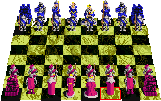|
March 17, 2002 From Anonymous I’m a budding game designer, and I’m interested in the idea of game mechanics being used as an emotive artform without the need to use metaphor as subject matter as so many video games do. My two biggest heroes, Ernest Adams and Chris Crawford, both see eye to eye on the idea that all games (without exception) are based on some factor of real life ... they say they’re a simplified model of an occurrence in life. I’d disagree. I’m not saying that NO games are simplified models of real life, just that not all of them have to be real-world inspired. Is it safe to say that Theseus and the Minotaur was NOT created with inspiration from that named theme? Was the theme an afterthought after you thought of the rules? I’d like to believe that very low level, unmetaphoric games do not necessarily come from real world inspiration. I just wanted to ask you the above to see if Theseus and the Minotaur was a good example of this (I realize it was probably derived from generic mazes’ schemes, but at least it wasn’t based on a factorable real world paradigm). I know it seems like a pretty strange question, but I happen to care too much about game design, and this is important to me. I want to be a game artist, not a videogame sweatshop worker. Some of your video games write up was correct. A lot of it was like me 2 years ago: anger without understanding. Since then, I’ve met a lot of talented people in the industry, and I’d just like to say that there ARE people who are more than aware that actual game design is lacking (I mean, come on ... do you really think you’re the only one who understands true design? If the answer is yes, it’s an insult to me, personally, as well as said friends in the industry who do have a clue), but they’re not able to display their talent because publishers just don’t publish risky games. It’s the awful truth. People get into the games industry wanting to do what you do, and instead are forced to work on some derogatory game that has been done a thousand times before, but this time with pointless feature X, and extra bust thrown in for good measure. You think they enjoy it? Hell no. But they DO have a paycheck to worry about. I’m sick of it, but I think it’s wrong to write off what CAN be a great tool in the creation of representations of game ideas, just because it has been temporarily milked for profits by this corporate world. I certainly won’t be party to it until it changes significantly. You can’t balance creativity against profits. You can’t shoehorn art into a profitable industry. If you really understand games, you’ll understand that this representational technology is like any other technology. It can be used for good or evil. Only taste and knowledge can tame them. Sorry for suddenly turning into a rant. (Not that you would want to, but please do NOT publish this on your site, or at least anonymously if you wish to.) You’re right. The Minotaur theme was just something I slapped onto that maze after I created it. My original idea for the maze came while I was thinking about the mechanics of the old video game Berserk. See my Further Notes on the Theseus and the Minotaur Mazes. Equipment game manufacturers have always used themes in the same idiotic way as the video game industry does today. In the ’40s and ’50s they would buy a license to a movie or TV show, then turn it into a theme they could slap onto a knockoff of Monopoly. After Trivial Pursuit became a big hit, they would license a property, add questions about the property, and would then have a knockoff of Trivial Pursuit. Here’s a funny story I heard: a game inventor had an original game, one that did not fit into any mold, and he showed it to a game company. They said, “But where are the question cards?” |
|
February 28, 2002 From: Kirk Israel He also posted this letter on his own web site and will archive it at this address. He added amusing screen shots of various video games to the letter; so I copied them and also added them here.
Classic Games are interesting to me in the way they had to create microcosms from scratch; thus, there was some more flexibility in the worlds they gave the player to interact with, along with fewer expectations about how good things needed to look (one programmer could do all the code, the sound effects, and the art). Some of this has been lost as games have grown in complexity, but I think your view of modern video games is very limited. You mistake some of the dominant trends for the whole thing. Yes, 90% of modern games are derivative crap, but that’s been true through many eras of gaming. Do you know how many Space Invaders and Pac Man clones there were? No, because they’ve properly fallen into the historical dustbin, of interest only to fans of the history of the field. (Actually, it’s probably more like 95% of games are derivative, and half of those are crap, and the other half provides decent experiences for fans of the genre.)
As for the “In fact, to this day no one has made a movie as funny as the silent comedies,” I don’t know if I agree. I think the audience reactions you describe have as much to do with audiences of the era than with the content itself. I haven’t watched many silent films, but it has been my experience that some of the comedies from the period right after in a similar physical style (Marx Brothers, Three Stooges) aren’t laugh out loud funny for modern viewers.
You might think that Miyamato is the exception that proves the rule...after all, he’s an old-schooler himself, having made games starting with Donkey Kong and moving into the future...but many game houses are experimenting with looks and styles other than “as realistic as possible.” There’s an interesting trend using “Cel Shading” that provides some very interesting new looks. Still 3D, but more animation-inspired. And even old school game style and variety is making a comeback in “party games” such as “Mario Party” or “Fuzion Frenzy,” that bundle many small and unique classic style games in a single graphical and gaming context. So in short, while I somewhat agree with some of your opinions about industry trends, I don’t think you’ve looked deeply enough at the trends you disparage, or to see what else is going with video games. —Kirk Israel Okay, okay, I confess! I never actually saw “Battle Chess.” I had read a review of it quite a while ago (I think it was in GAMES magazine), and at the time I thought that adding more realism to chess was a really silly idea. Now, if the designers of Battle Chess intended to be silly, then that’s okay. But the review indicated that adding realism to chess was an excellent idea. I was mostly arguing against what the reviewer thought.
February 24, 2002 I agree with some points but disagree about others. Yes, a lot of modern games truly suck. However, there have been some extremely wonderful modern ones. Half-Life, No One Lives Forever, Independence War, Aliens Vs. Predator, Alpha Centauri, Soul Caliber, Tony Hawk, Crazy Taxi, etc. The difference between top-down and first person is exactly the same as in silent movies and comedies, i.e. apples and oranges. Silent comedies rely on visual and physical humor. You cannot get the banter feel of a good standup in there. If movie makers choose to make crappier movies when they have more tools at their disposal that’s their problem, not the tool’s problem. But I do agree with your basic thesis, that the reason why modern games suck when they suck is because the designers have gotten too distracted. There is so much eye candy they can throw at a game that the fun factor is very easy to miss. There aren’t that many arcade games being made right now, arcade defined in my mind as a game you can pickup in 5 minutes and start playing from there. Tony Hawk and Crazy Taxi are excellent arcade style games, albeit more complex than the games of old. Soul Caliber is technically arcade but has a steep learning curve. It is, though, an extremely excellent game. But seriously, if you are into games, check out Half-Life, check out No one Lives Forever. Also look for the original Aliens Vs. Predator. These games show you what first person gaming is all about. Half-Life is a movie you play through, in a good way. Even more so with No One Lives Forever. And if you like space sims then nothing can beat Independence War. Asteroids sucks ass compared to that.
January 3, 2002 This is an excerpt from a letter by Bao Nguyen-Huu You mentioned a lot about realism in the essay, but I don’t agree with that; most game companies, I believe, take you far away from realism. This is an interesting point. It could be argued that video games go beyond realism to something that you could call “surrealism.” Like the surrealist painters, video games create detailed, extremely realistic depictions, but depictions of impossible things. September 26, 2001 From David Hello, I arrived at your site from a site that dealt with the Theseus and the Minotaur mazes, as I was looking for more online mind games. I read your diatribe about video games and was moved to respond. A number of your statements are over-generalized, and beg some revision, to say the least. For the last ten years or so, video game manufacturers have been trying to increase their profit by expanding their base of appeal. That means that manufacturers are trying to draw a larger audience than what was previously present. Younger audiences are not capable of higher logic, and so games that are designed to appeal to those audiences cannot include puzzles they can’t solve, or those younger players will become frustrated and turn away from a game or a manufacturer. So game manufacturers have two courses they can take—they can produce games specifically with a younger crowd in mind (a target audience that is hard to please), or they can “dumb down” existing projects. This is unfortunate but true, and is part of the motivation for including cheat codes and difficulty setting options. There are mind-numbingly repetitive games out there. As an example, there is a series of racing games called “Gran Turismo” for the PlayStation. Its most recent incarnation, “Gran Turismo 3 A-Spec” is a PlayStation 2 game subtitled “The racing simulator.” Now, there are people out there who will watch all 500 laps of a Nascar race around a perfectly oval track and not get bored. This game has endurance races that are exactly like that—very large numbers of laps around the same track, over and over. The point is, there is an audience who appreciates being able to play that type of race, and you can’t fault manufacturers for playing to that market. They didn’t create it. They’re in the business of making money, and those people will pay to be able to race like their heroes. One of the best series of video games out there is the Zelda series by Nintendo. The original game, “The Legend of Zelda” was written for the 8-bit Nintendo Entertainment System in 1984. This game was an instant hit because it followed your formula very closely. It was a top-down game that followed the hero as he explored his land on a quest to save the princess. (A formulaic plot, but that wasn’t really the point.) What made the game great were the dungeons the player explored. They were mazes that required puzzle-solving skills, progressing in complexity from dungeon 1 through dungeon 8. Each maze had a boss at the end that would only respond to certain types of attacks, given in clues by the people inhabiting the land. There have been six or seven different Zelda games, but the most successful version after the first was “The Legend of Zelda: A Link to the Past,” for the 16-bit Super Nintendo. This game had better graphics, a more compelling story line, more puzzles, and a larger land to explore. It also included side quests that required puzzle-solving skills. These side quests were not essential to the main game, but added more character development, and required varying levels of in-depth analysis. The point that I’m trying to make is that games are not necessarily poorer because of their increased graphic potential. It’s all in the hands of the game manufacturer. The first version of Zelda for the Nintendo 64 was a greatly anticipated title, and “Ocarina of Time” turned out to be an even bigger hit for Nintendo, because of its game play and puzzles. This time, however, players were greeted with a “behind the hero” view in 3D. Players were skeptical at first, having grown to love the top-down view that you like to promote, but the implementation was very good. The hero has a number of items and weapons at his disposal, all of which are aimed from the hero’s point of view. The use of these tools and items is what enables the player to solve certain puzzles. For instance, there is a door in one of the dungeons that can only be opened by exposing the sandstone door to sunlight. Unfortunately, this being a dungeon, sunlight isn’t readily available, so the player must construct a way to reflect the sunlight on this door using a series of mirrors, finishing off the sequence with a mirrored shield carried by the hero. Small children are attracted to this game because of the pretty graphics, but are dismayed when they are stumped by the game’s cognitive requirements, its dependence on manual dexterity, and a player’s ability to remember and link together vague clues to solve puzzles that block the way to the game’s end. There is another series of games that’s been popular recently, the “Final Fantasy” series produced by Squaresoft for the PlayStation. Here is an example of exactly what you’re talking about. True devotees of the series admit its peak at about Final Fantasy #5. The action was important to the plot development, and it required puzzle-solving skills and intelligence to finish the game. Final Fantasy 10 is the most recent version, and it includes a whole lot of unnecessary video. Each Final Fantasy game since 7 has included more and more full motion video (FMV, as it’s called in the industry). FMV is pretty, to be sure, but time spent watching a video is time spent not playing the game. Square uses the video to develop the characters and provide information to your quest that your characters otherwise would not see. While that’s theoretically fine, Square has gone a bit too far, with the last few games requiring 4 CDs to fit all the information. The last few versions of Final Fantasy have only required perseverance to complete, so I agree with you in this case: the graphically attractive games sometimes rely on just that to propel their popularity. They are pretty to look at, but in the same way that a seashell is pretty. You pick it up, look at it and admire its beauty, but ultimately, it slips from your mind. Combat games have been pretty popular recently. Again, this is a case of the industry playing to a particular market. Does this market exist because our society has been getting more violent recently? Is the media popularizing violent acts? Is it because of the music our nation’s teens are listening to? Or is it just a convenient way for two people to act out their aggression? I don’t profess to know why the market exists, but it does. The point of all this is that the blanket statements you are making are a bit too broad. If a game is bad, that’s not a statement about the video game industry at large, that’s a statement about the video game manufacturer who produced and sold a poor game. Every game has an audience who appreciates it and buys it. There are only a few games produced each year that are truly good games in and of themselves (usually less than five), independent of the platform for which they are produced, be it PC, Nintendo, Sony, or any other gaming system. Those most timeless and successful games are the ones that engage a player mentally, as well as visually. They do exist. Regards, David To the CON responses and Closing Remarks
Back to "Video Games Are Incredibly Stupid!" |



